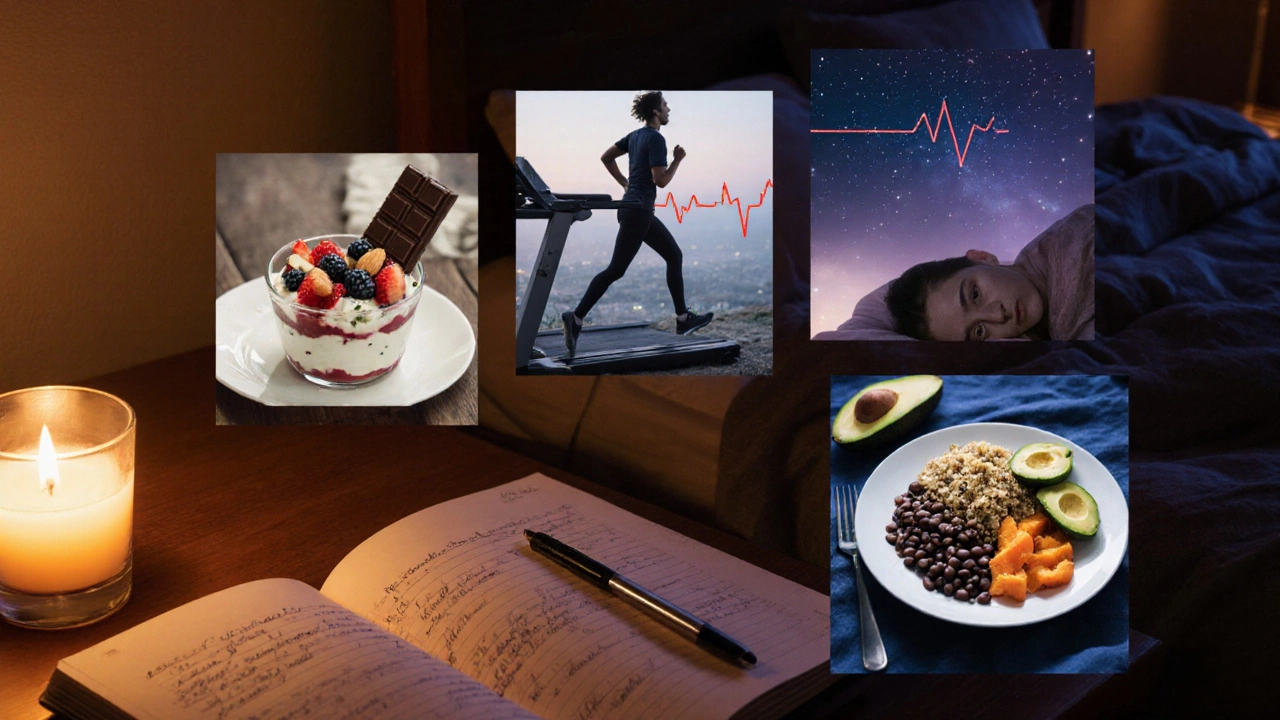How Diet and Exercise Can Boost Low Libido
 Oct, 13 2025
Oct, 13 2025
Libido Boost Calculator
Assess Your Libido Boost Score
Answer a few questions about your diet and exercise habits to see how they impact your sexual desire.
Your Libido Boost Score
Your score will appear here
When desire drops, many assume the problem lives only in the bedroom. In reality, low libido often reflects what’s on the plate and what’s moving the body. By tweaking the foods you eat and the way you work out, you can naturally lift sexual interest without a single prescription.
What Is Low Libido?
Low libido is a reduced sexual desire or interest that can affect anyone regardless of age or gender. It isn’t always a sign of a medical condition; stress, poor sleep, hormonal shifts, and lifestyle habits play huge roles. Understanding the root cause is the first step before any diet or workout plan can work its magic.
How Diet Influences Sexual Desire
Diet the collection of foods and beverages you consume daily supplies the building blocks for hormones, blood flow, and nerve function-all critical for a healthy sex drive. Nutrient‑dense meals keep arteries clear, support hormone synthesis, and reduce inflammation, which together create a body ready for intimacy.
Research from the Journal of Sexual Medicine (2023) shows that people who follow a Mediterranean‑style eating pattern report a 25% higher libido score than those on typical Western diets. The differences stem from higher intake of healthy fats, antioxidants, and plant proteins.
| Aspect | Mediterranean Diet | Typical Western Diet |
|---|---|---|
| Healthy Fats | Olive oil, nuts, fatty fish (omega‑3) | Processed vegetable oils, trans fats |
| Fiber | Whole grains, legumes, vegetables | Refined grains, sugary snacks |
| Antioxidants | Tomatoes, berries, leafy greens | Low antioxidant intake |
| Sugar | Moderate, natural sources | High added sugars |
Key Nutrients That Boost Libido
While overall diet matters, a few nutrients stand out for their direct effect on sexual hormones and circulation.
- Testosterone a primary male sex hormone also present in women, essential for desire. Adequate zinc, vitamin D, and healthy fats support its production.
- Estrogen the female hormone that influences libido, especially during menopause. Phytoestrogens from soy and flaxseed help maintain balanced levels.
- Omega‑3 fatty acids found in fish oil, walnuts, and chia seeds, improve blood flow and reduce inflammation.
- Zinc crucial for hormone synthesis; deficiency can lower testosterone by up to 30%. Beef, pumpkin seeds, and lentils are rich sources.
- Magnesium helps relax blood vessels, supporting erectile function and arousal. Dark chocolate, leafy greens, and nuts provide it.
Exercise Types That Elevate Desire
Exercise any planned, structured physical activity that improves fitness does more than burn calories; it triggers hormone release, improves mood, and enhances circulation-all ingredients for a healthy libido.
Two categories show the strongest link to sexual health:
- Resistance training weightlifting or body‑weight work that builds muscle mass. Studies indicate that three weekly sessions can raise testosterone by 15-20% in men and improve body confidence in women.
- Cardiovascular exercise activities like running, cycling, or swimming that boost heart health. Better blood flow means stronger erections and heightened sensitivity.
Even short, high‑intensity interval training (HIIT) boosts endorphins and nitric oxide, which relaxes blood vessels and supports arousal.
Sample Day: Meals + Workout for a Libido Lift
- Breakfast: Greek yogurt with berries, a tablespoon of ground flaxseed, and a handful of almonds (omega‑3, zinc, magnesium).
- Mid‑morning snack: Apple slices with peanut butter (healthy fats, protein).
- Lunch: Grilled salmon salad with spinach, cherry tomatoes, olives, and olive‑oil vinaigrette (testosterone‑supporting fats, antioxidants).
- Pre‑workout: A small banana and a scoop of whey protein (quick carbs, amino acids).
- Workout (45min):
- 5‑minute warm‑up jog
- 3 sets of 8-10 reps - squats, deadlifts, bench press (resistance)
- 2 sets of 30‑second sprints (HIIT cardio)
- Cool‑down stretch focusing on the lower back and hips
- Dinner: Quinoa bowl with black beans, roasted sweet potato, avocado, and a squeeze of lime (fiber, zinc, healthy fats).
- Evening: Herbal tea with magnesium‑rich chamomile and a few dark chocolate squares.
Stick to this routine for at least four weeks, then assess changes in desire, energy, and mood.

Common Pitfalls and How to Avoid Them
- Skipping breakfast - lowers blood sugar and can blunt hormone spikes.
- Relying on processed snacks - they spike insulin and increase inflammation.
- Overtraining - excessive cardio without recovery can lower testosterone.
- Neglecting sleep - poor sleep cuts testosterone by up to 40%.
- Alcohol excess - reduces circulation and depresses the nervous system.
Balance is key: aim for 7-9 hours of sleep, limit alcohol to 1-2 drinks per week, and incorporate rest days into your workout schedule.
Tracking Progress and When to Seek Professional Help
Keep a simple journal noting:
- Energy levels each morning.
- Frequency of sexual thoughts or fantasies.
- Performance metrics (e.g., erection firmness, orgasm intensity).
- Diet adherence - note any missed meals or cheat days.
If after 8-12 weeks you see little improvement, consider a check‑up. Hormone panels, thyroid tests, and mental‑health screenings can uncover hidden blockers.
Frequently Asked Questions
Can a vegetarian diet improve libido?
Yes, if it’s rich in plant‑based proteins, zinc (pumpkin seeds, lentils), and omega‑3 sources like chia or algae oil. Pairing these with regular resistance training can match the benefits of a meat‑based diet.
How often should I do cardio to boost sexual health?
Aim for 150 minutes of moderate cardio (brisk walking, cycling) or 75 minutes of vigorous activity (running, HIIT) per week. Spread sessions across the week to avoid burnout.
Is there a specific time of day that’s best for workouts?
Morning sessions can raise testosterone levels for the day, while evening workouts improve blood flow and reduce stress. Choose what fits your schedule and stick to it consistently.
Do supplements like maca or ginseng really work?
Evidence is mixed. Some small studies show modest improvements in desire, but the effect is usually stronger when combined with a nutrient‑dense diet and regular exercise.
Should I get my hormone levels tested?
If lifestyle changes don’t help after 3 months, a basic panel (testosterone, estrogen, thyroid, vitamin D) can pinpoint deficiencies or imbalances that need medical attention.
Stephen Richter
October 13, 2025 AT 16:18The relationship between macronutrient distribution and endocrine function is well documented. A diet rich in monounsaturated fats, for instance olive oil, supports testosterone synthesis. Conversely, excessive refined carbohydrates can impair insulin sensitivity and indirectly affect libido. Incorporating regular resistance training amplifies these dietary benefits. Consistency remains the pivotal factor.
Musa Bwanali
October 22, 2025 AT 01:02Listen up, you can crank that desire level by locking in a solid workout schedule! Hit the weights three times a week, push the intensity, and watch your testosterone surge. Pair those sessions with a Mediterranean plate loaded with nuts, fatty fish, and leafy greens-your body will thank you. No excuses, just results! Keep the momentum and the bedroom will follow.
Allison Sprague
October 30, 2025 AT 08:45While the article attempts to stitch together diet and exercise advice, it often stumbles into vague generalities that betray a lack of rigorous sourcing. The claim that “omega‑3s improve blood flow” is scientifically sound, yet the piece omits discussion of dosage thresholds, leaving readers adrift in a sea of ambiguity. Moreover, the recommended “150 minutes of moderate cardio” is tossed in without acknowledging individual variance in cardiovascular capacity, which is a crude simplification. A more nuanced approach would juxtapose hormonal assays with dietary logs, thereby granting the reader a tangible framework for self‑assessment. In short, the guide skirts the depth required for actionable precision.
leo calzoni
November 7, 2025 AT 17:29Your diet is probably junk. Switch to olive oil and fish. Stop the processed crap. Build muscle, not fluff. Then you’ll notice the difference.
KaCee Weber
November 16, 2025 AT 02:13Hey folks, let’s take a moment to celebrate how food and movement can become the ultimate love‑fuel duo! 🌟 First, imagine starting your day with a bowl of creamy Greek yogurt, a handful of antioxidant‑rich berries, and a sprinkle of chia seeds-this power combo delivers protein, omega‑3s, and magnesium, all of which whisper sweet nothings to your hormonal orchestra. 🍓 Next, as you sip that herbal tea mid‑morning, consider the subtle lift that comes from balanced blood sugar, preventing those dreaded crashes that can sap desire. 😌 When lunch rolls around, a vibrant salad drenched in extra‑virgin olive oil, tossed with grilled salmon, spinach, and toasted walnuts becomes a symphony of healthy fats and iron, nurturing both stamina and confidence. 🥗 The afternoon slump is no match for a quick 10‑minute walk or a set of body‑weight squats, which spikes endorphins and keeps circulation humming. 🔥 Moving into the evening, a well‑structured resistance session-think deadlifts, bench presses, and rows-does more than sculpt muscle; it triggers a cascade of testosterone and growth hormone, paving the way for heightened libido. 🏋️♀️ After the workout, a modest protein shake paired with a banana refuels glycogen stores, ensuring you’re not left feeling depleted when intimacy calls. 🍌 Finally, dinner should honor the night’s rhythm: a quinoa bowl with black beans, avocado, and roasted sweet potatoes delivers fiber, zinc, and potassium, all essential for vascular health. 🌙 As you unwind, a cup of chamomile tea laced with a drizzle of honey calms the nervous system, allowing cortisol levels to drop and relaxation to settle in. 💤 Remember, consistency beats occasional intensity; aim for at least seven hours of restorative sleep, and your endocrine system will thank you. 📈 Hydration, too, is often overlooked-water acts as the medium for nutrient transport, and dehydration can blunt both performance and desire. 🚰 Keep alcohol intake modest; a couple of drinks won’t ruin a good day, but excess will drown the benefits you’re building. 🍷 In a nutshell, treat your body as a holistic ecosystem where each meal and movement session plays a supportive role, and you’ll soon notice a natural, sustainable boost in sexual drive. 🌈 Let’s get out there, experiment, and share our progress-after all, the journey is far more rewarding when we lift each other up! 🙌
jess belcher
November 24, 2025 AT 10:56Great rundown, the step‑by‑step plan really ties the nutritional points together. I especially like the reminder about hydration and sleep. It makes the whole approach feel doable.
Sriram K
December 2, 2025 AT 19:40That aggressive push is exactly what many need to break through plateaus. Pairing compound lifts with progressive overload ensures testosterone spikes stay consistent. Also, consider cycling intensity every four weeks to avoid adrenal fatigue. Keep tracking your macronutrients so the diet aligns with training demands.
Deborah Summerfelt
December 11, 2025 AT 04:24Sure, the textbook says fats help hormones, but ever wonder why some folks on keto still feel flat? Maybe it’s not just the food, maybe the mind’s narrative about “healthy” creates hidden stress that smothers desire.
Maud Pauwels
December 19, 2025 AT 13:07I appreciate the emphasis on balanced meals and consistent sleep. Small changes over time tend to be sustainable for most people.
Scott Richardson
December 27, 2025 AT 21:51America’s strength comes from disciplined men and women who fuel their bodies right.
Laurie Princiotto
January 5, 2026 AT 06:35Honestly, “small changes” sound like an excuse for laziness 😒 If you really want results, you need a bold plan, not a gentle whisper.
Justin Atkins
January 13, 2026 AT 15:18The integration of micronutrient timing with circadian rhythm can further potentiate endocrine responsiveness, a nuance often omitted in mainstream guides. Aligning protein intake post‑exercise with peak insulin sensitivity not only augments muscle repair but also amplifies luteinizing hormone surges, thereby fostering a more robust libido. Such synergistic strategies underscore the value of evidence‑based precision in lifestyle medicine.